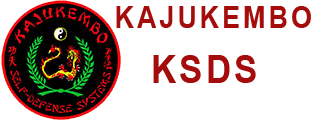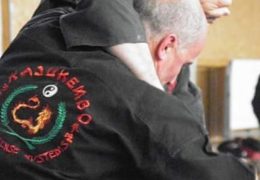Nowadays, when a practitioner from Kajukembo prepares to go to training, he says: “I go to the gym.” But when using the word “gymnasium”, the phrase is understood differently to say: “I go to the Dojo.” And this is so because in Japanese, “Dojo” is the place where the Way is made, that is, where a person develops the skill in the practice of a Martial Art, at the same time that he forges his character, controls and channels his emotions and instincts and evolves as a human being. And all this using as an instrument the technique of the specific art that you have chosen.
When a student from Kajukembo arrives at the Dojo, it should be clear that he will not only exercise physically there, since, in addition to the body, in training it is necessary to include the mind and spirit. In the practice of Budo, these three factors, body, mind and spirit, are inseparable and must be trained in an integral way; for this, total attention and concentration in our actions is necessary, especially when our life or physical integrity may depend on them. This refers to the three qualities that practitioners must manifest: 1- the spirit, the character, 2- the technique in the art practiced and 3- the bodily elements. That is to say when we kick, it is evident that it is a physical act, but what is really important is not the muscular action but the attitude and intention with which we execute the technique, since this will only be effective if all our be. If during the practice we are distracted and we talk to our classmates; if we wait anxiously for breaks or breaks, and we also waste them to talk: if we worry about how much is needed to finish; if we fear that we have a partner who works very hard; if we think – externalizing it or not – “Ugh, again this Kata …!”; If we doubt the methodology of the teacher, and ultimately if we occupy our mind in things or actions outside the training, we are moving away from the original meaning of the practice of Martial Arts.
Therefore, practitioners should adopt the following standards:
– Avoid distractions and interruptions without just cause.
– Make quickly and without superfluous comments the techniques that the teacher sends in order not to break the harmony and energy flow.
– Wait for breaks or breaks to ask the teacher. The sincere student must practice at all times with the five senses placed in each gesture, in each action and in each of the techniques he performs, as if it were the last time he practices art and wanted to savor every moment, every moment. , every movement. Similarly, in the exercises in pairs or with colleagues should give the best of himself, emphasizing the delivery and decision in their defenses and attacks, and seeking harmony and mutual progress. For this, a true practitioner of Kajukembo must avoid the following behaviors or attitudes:
– Practice without motivation and without trying to improve yourself day by day.
– Talk, distract or not be attentive during practice.
– Risking the risk of injuring oneself or damaging peers by satisfying their ego, anger, anger, fear, etc.
– That the degree or sporting successes go to his head.
– Feeling superior or more qualified than other colleagues.
– Be noted, boast or boast of feats, etc.
– Try to impose personal criteria, even knowing that they are not those of the teacher. – Question or discuss the teacher’s teachings or publicly boast about it.
– Underestimating others to exalt himself.
– Create enmities between colleagues or between people. – Speak badly or criticize other Martial Arts or their practitioners.
– Put into question the knowledge or skill of the teacher, advanced degrees or other peers. – Review or criticize the degrees or belts awarded by the teacher to other students.
– Abusing the confidence of the teacher or other colleagues.
– Being violent, selfish, proud, cocky or ill-intentioned. In short, it would be very desirable for the practitioners to give themselves to the maximum in the classes, as if their life depended on it; but always with the physical and emotional control that common sense gives.Sometimes, due to daily dealings, misunderstood friendship, overconfidence or simply because of ignorance, the “protocol”, or rules of conduct in the Dojo, is misunderstood and worse used. Clear examples of this are not knowing how to behave in class, relaxing the manners, not keeping the proper composure, the lack of punctuality in the class and the lack of seriousness and responsibility in practice. These bad attitudes degenerate into a lack of respect and consideration towards the teacher, towards classmates and towards oneself. These are situations that can lead to neglect, informality and adulteration of the values of Martial Arts. Therefore, students should understand that, although sometimes the teacher does not call attention to them in a direct or explicit way, this does not mean that the student’s incorrect behavior goes unnoticed or does not give importance. Therefore, advanced students should guide, advise and correct beginners so that they do not get confused about attitude.




 Tweet
Tweet

